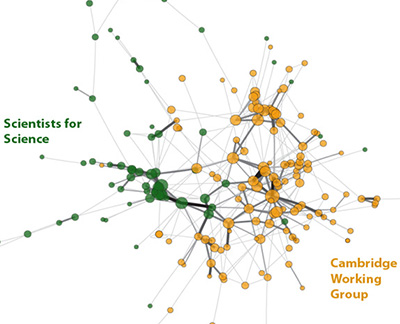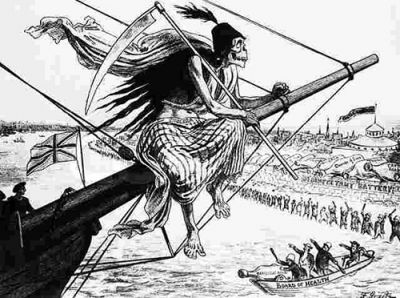Faculty Receive Bass Connections Awards to Develop Courses
May 20, 2016
Bass Connections has awarded four course development funds to groups of Duke faculty members whose pedagogical ideas will expand interdisciplinary curricular options for undergraduates as well as graduate and professional students.
This Spring an RFP invited Duke faculty, departments or schools to organize new courses or modify existing ones that align with one or more of the Bass Connections themes and are multidisciplinary, open to students at different levels and/or ask questions of societal importance. Such courses will augment theme leaders’ efforts to enrich the curricular pathways available to undergraduate and graduate students.
Managing Networks
 Submitted by Lisa Keister with Susan Alberts, Christopher Bail, Jonathon Cummings, James Moody, Martin Ruef
Submitted by Lisa Keister with Susan Alberts, Christopher Bail, Jonathon Cummings, James Moody, Martin Ruef
- Faculty affiliations: Trinity College of Arts & Sciences (Biology, Evolutionary Anthropology, Sociology, Markets and Management Certificate Program); Fuqua School of Business; Nicholas School of the Environment (Marine Science and Conservation); Center for Population Health & Aging; Duke Institute for Brain Sciences; Duke Network Analysis Center; Duke Population Research Institute
- Bass Connections theme: Information, Society & Culture
Networks are pervasive in the social, economic, political and natural worlds. Network data and methods – and concurrently our ability to conceptualize and analyze networks – have expanded dramatically in recent years, and Duke is a central location in which this research is being conducted. This course is about the role that networks play in organizations. It will involve multiple faculty from across schools, invite outside experts to provide guest lectures and include project-based assignments. Graduate students and post-docs from various disciplines will participate as assistants and project leaders.
Engineering and Anthropology of Biomedical Engineering (BME) Design in Uganda
 Submitted by William Reichert and Kearsley Stewart
Submitted by William Reichert and Kearsley Stewart
- Faculty affiliations: Pratt School of Engineering (Biomedical Engineering); Trinity College of Arts & Sciences (Cultural Anthropology); Duke Global Health Institute
- Bass Connections themes: Information, Society & Culture; Global Health; Education & Human Development
Dr. Reichert established the Duke-Makerere University in Kampala (MUK) BME Partnership in coordination with Duke BME, Duke Global Health Institute, Pratt School of Engineering, the Provost’s Office and the Duke Africa Initiative. The goal of this course is to integrate the design and anthropological elements of the Duke-MUK experience into a single course offered to both BME and global health undergraduate and graduate students. It will proceed pedagogically as a design class superimposed with the relevant anthropology of working directly with students in Uganda.
History of Global Health
 Submitted by Nicole Barnes and Margaret Humphreys
Submitted by Nicole Barnes and Margaret Humphreys
- Faculty affiliations: Trinity College of Arts & Sciences (History); School of Medicine; Duke Global Health Institute
-
Bass Connections theme: Global Health
The history of global health contains valuable perspectives for thinking through current health challenges. The course begins with the development of ancient medicine in Europe and China, and continues into the rise of biomedicine in the 19th and 20th centuries. It addresses particular diseases as case studies through which to explore important themes in global health history, and traces global circulations of people and commodities to show how international agencies, charities and governing bodies have spread both disease and the means to fight it.
Integrating Environmental Science and Policy
 Submitted by Lori Bennear and Patrick Halpin
Submitted by Lori Bennear and Patrick Halpin
- Faculty affiliations: Nicholas School of the Environment (Environmental Economics and Policy, Marine Science and Conservation); Trinity College of Arts & Sciences (Economics); Sanford School of Public Policy; Energy Initiative; Science & Society
- Bass Connections theme: Energy
Environmental challenges are inherently multidisciplinary, drawing upon principles from ecology, earth sciences, biochemistry, economics, political science and ethics. Employing in-depth case studies, this course will explore the complex interactions that characterize current environmental problems. Course objectives include: exposing students to interdisciplinary approaches to environmental science and policy; allowing students to develop analytic tools to address environmental issues; and fostering collaborative group-based analytic experiences consistent with real-world environmental problem solving.
Faculty recipients of these course development funds will be invited to share their experiences at a luncheon or dinner at the end of year.
Learn how to get involved with Bass Connections.
